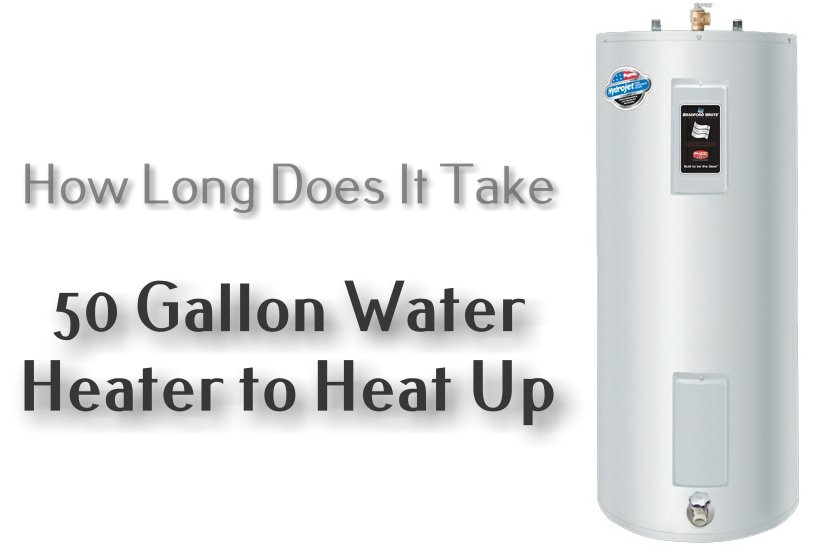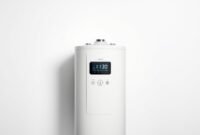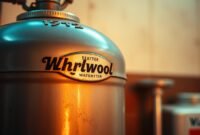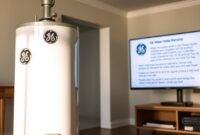Ever stepped into the shower only to be greeted by an icy blast instead of warm water? Cold showers can be a frustrating reality when your 50 gallon water heater struggles to keep up. Most homeowners don’t realize how critical understanding water heater heating time can be until they’re left shivering.
The time it takes for a 50 gallon water heater to heat up varies dramatically. Electric models typically need 2-3 hours, while gas water heaters can warm up in just over an hour. I’ll break down the key factors that impact your water heating performance and help you optimize your home’s hot water system.

Understanding Water Heater Basics
Water heaters are key for home comfort, providing hot water for daily needs. I’ll explain the main parts and how they work. This will help you grasp how energy efficient water heaters function.
Read also: What Size Hot Water Heater for Family of 4 Will Need?
Essential Components of a Water Heater Tank
A water heater tank has important parts for heating and storing water:
- Insulated tank for water storage
- Heating element (electric or gas-powered)
- Thermostat for temperature control
- Anode rod to prevent corrosion
- Pressure relief valve for safety
How Water Heaters Function
Water heaters work in a straightforward way. Cold water enters the tank through a dip tube. It gets heated and rises to the top. When you turn on a hot water tap, heated water flows out.
Types of Energy Sources
| Energy Source | Efficiency | Average Heating Time |
|---|---|---|
| Natural Gas | High | 30-40 minutes |
| Electric | Medium | 60-80 minutes |
| Propane | High | 35-45 minutes |
Energy efficient water heaters can cut down your utility bills. They use less energy to heat water. When choosing a water heater, think about the energy source and efficiency rating.
Gas vs Electric Water Heaters: Heating Time Comparison
When picking a water heater, knowing the heating speed difference between gas and electric is key. A 40-gallon gas water heater heats water much faster than electric ones.
Gas water heaters usually heat water quicker and more efficiently than electric ones. A standard 40-gallon gas water heater can heat water in about 30-40 minutes. An 80-gallon gas water heater might take 60-70 minutes to fully heat up.
Read also: Rheem 20 Gallon Electric Water Heater
- Gas Water Heater Advantages:
- Faster heating times
- Lower operational costs
- More consistent temperature regulation
- Electric Water Heater Characteristics:
- Slower heating performance
- Higher electricity consumption
- Potentially lower upfront installation expenses
| Water Heater Type | Tank Size | Average Heating Time | Energy Efficiency |
|---|---|---|---|
| Gas Water Heater | 40-gallon | 30-40 minutes | High |
| Gas Water Heater | 80-gallon | 60-70 minutes | Very High |
| Electric Water Heater | 40-gallon | 60-80 minutes | Moderate |
Deciding between a 40-gallon gas water heater and an electric one depends on your needs. Gas models heat water faster and are better for big families or homes needing lots of hot water.
Factors Affecting Water Heating Speed
Knowing what affects your water heater’s speed is key to better water heating at home. Several things can change how fast water gets hot, impacting your water heater’s capacity.
Water heating efficiency depends on a few important factors. Let’s look at the main ones that can make your water heating faster or slower.
Water Temperature Settings
The thermostat setting on your water heater is very important. It affects how fast water heats up and how much energy it uses. Most experts suggest keeping it between 120-140 degrees Fahrenheit. Higher temperatures mean longer heating times and more energy use, while lower settings might not be as efficient.
- Optimal temperature range: 120-140°F
- Higher settings increase heating time
- Lower settings may compromise hot water availability
Incoming Water Temperature
The temperature of water coming into your heater also matters a lot. In winter, this water is colder, making your heater work harder. This affects your heater’s capacity and how well it performs.
Environmental Conditions
The temperature around your heater and where it’s located can also change heating speed. Heaters in cold basements or unheated areas take longer to warm water. But, placing your heater in a warmer spot and insulating it can make heating faster.
- Basement locations slow heating process
- Insulation helps maintain water temperature
- Heated spaces improve overall performance
How Long Does It Take for a 50 Gallon Water Heater to Heat Up

Wondering how long it takes for a 50 gallon water heater to heat up? It depends on the type of water heater you have. Electric and gas water heaters heat water at different rates, affecting your hot water supply.
An electric 50 gallon water heater takes about 145-150 minutes to heat up fully. On the other hand, a gas water heater heats the same tank in 60-80 minutes. This big difference makes gas water heaters better for homes that use a lot of hot water.
- Electric water heater: 145-150 minutes
- Gas water heater: 60-80 minutes
- Actual heating time can vary based on several factors
The time it takes for a 50 gallon water heater to heat up isn’t just about the energy source. Other things like the water’s starting temperature, the room’s temperature, and the water heater’s age also play a role. Newer models with better insulation and heating elements heat water faster than older ones.
If you’re worried about how long it takes for a 50 gallon water heater to heat up, think about your household’s needs. Families that use a lot of hot water might prefer a gas water heater or even consider tankless water heating for quicker access to hot water.
Recovery Time After Hot Water Depletion
Knowing how long it takes for your water heater to recover is key. It affects how fast you get hot water again. This is important for enjoying showers and doing daily tasks without interruption.
Several factors affect how quickly your water heater refills with hot water. These include:
- Energy source (gas or electric)
- Tank capacity
- Incoming water temperature
- Heating element efficiency
First Hour Rating Explained
The First Hour Rating (FHR) shows how much hot water your heater can make in an hour. For a 50-gallon tank, it’s usually 50-60 gallons. Knowing this helps you plan for when you need hot water most.
Peak Usage Considerations
When you need hot water a lot, like in the morning or evening, knowing recovery time is key. Gas heaters usually heat up faster, taking 30-40 minutes. Electric ones might take 60-80 minutes.
- Gas water heaters: Faster recovery (30-40 minutes)
- Electric water heaters: Slower recovery (60-80 minutes)
To make your water heater recover faster, try a few things. Insulate your tank, adjust the temperature, and get regular maintenance. These steps can make your water heater work better and save you time waiting for hot water.
Common Issues That Slow Down Heating Time
When your new hot water heater doesn’t heat up right, several key problems might be the cause. Knowing these common issues can help you find and fix heating problems fast.
Sediment buildup is a big reason for slow water heating. Minerals like calcium and magnesium build up at the bottom of your tank. This creates a barrier that stops heat from spreading well. It makes your heating elements work harder, which slows things down a lot.
- Faulty heating elements can dramatically slow down water heating
- Broken thermostats may prevent accurate temperature regulation
- Incorrect thermostat settings can impact heating efficiency
Electrical issues are another big problem for people with new hot water heaters. Damaged wiring, tripped circuit breakers, or loose connections can stop the heating process. This leads to water that’s not always the right temperature.
When you’re trying to figure out what’s wrong, here are some things to check:
- Inspect heating elements for signs of wear or damage
- Verify thermostat settings are correct
- Check circuit breakers and electrical connections
- Look for visible sediment in the tank
If simple checks don’t fix your heating issues, it’s time to call a pro. Serious problems might need a professional to diagnose and fix.
Maintenance Tips for Optimal Heating Performance
Keeping your water heater in top shape is key for efficient heating and a longer life. As a homeowner, I’ve found that regular maintenance saves money and avoids sudden breakdowns.
There are several important steps for maintaining your water heater. These steps can greatly improve its performance and efficiency.
Sediment Removal Process
Sediment buildup can cut down your water heater’s efficiency a lot. I suggest flushing the tank once a year to clear out mineral deposits and debris. Here’s how to do it:
- Turn off the power or gas supply
- Connect a garden hose to the drain valve
- Open the valve and drain the tank completely
- Flush with cold water until it runs clear
Temperature Setting Adjustments
It’s important to manage your water heater’s temperature for both efficiency and safety. I recommend setting it between 120-130 degrees Fahrenheit. This prevents scalding and saves energy.
| Temperature Range | Energy Efficiency | Safety Level |
|---|---|---|
| Below 120°F | Low | Bacteria Risk |
| 120-130°F | Optimal | Safe |
| Above 140°F | Low | Scalding Risk |
Regular Inspection Schedule
Having a regular inspection checklist is helpful. It catches problems early. My water heater maintenance tips include:
- Check the pressure relief valve every six months
- Inspect the anode rod for corrosion annually
- Look for any signs of water leaks or rust
- Test the temperature and pressure settings
By following these tips, you’ll keep your water heater running well and last longer.
Energy Efficiency and Heating Speed
Energy efficiency in water heating is more than saving money. It’s about getting hot water fast and smart. Modern water heaters make this possible while keeping bills low.
The latest water heaters have cool features that boost heating speed. They use new tech to heat water faster and use less energy than old models.
- Improved insulation reduces heat loss
- Smart temperature controls optimize heating cycles
- Advanced heating elements increase efficiency
- Faster recovery rates with minimal energy consumption
What makes these water heaters special includes:
- Heat pump technology
- Condensing gas water heaters
- Tankless water heating systems
- Solar-assisted water heating
Choosing an energy efficient water heater brings big benefits. These systems heat water faster and use up to 50% less energy. This means big savings on bills and a smaller carbon footprint.
Signs Your Water Heater Needs Replacement
Knowing when to replace your water heater can prevent cold showers and water damage. If your new hot water heater isn’t heating, it’s a big warning sign. Something might be seriously wrong with your system.
Here are some key signs it’s time for a new water heater:
- Age of the water heater (over 10 years old)
- Persistent rusty or discolored water
- Unusual noises like popping or cracking sounds
- Frequent repair requirements
- Significant decrease in hot water supply
Age is a big factor in water heater performance. Most last 8-12 years. If your water heater is getting close to or over this age, it might be cheaper to replace it than keep fixing it. If your new hot water heater keeps not heating, it’s a sign your old one is done.
Getting a new water heater has many benefits. They use less energy, which can lower your bills. They also work better, keep water temperature steady, and have new tech that makes them last longer.
Don’t wait for your water heater to fail completely. Keep an eye on it to plan a replacement before it breaks down and messes up your day.
Comparing Different Tank Sizes and Their Heating Times
Choosing the right water heater size is key to efficient hot water use at home. The size of the water heater affects how fast it heats water. It’s important to pick a size that fits your household’s needs.

Looking at water heaters, you’ll see many sizes with different heating times. A 40-gallon gas water heater heats up in 30-40 minutes. On the other hand, an 80-gallon gas water heater takes about 60-70 minutes.
Understanding Tank Size Performance
Different tank sizes meet different household needs. Here are some key points to consider:
- 40-gallon gas water heater: Great for small to medium-sized homes
- 50-gallon models: Good for average-sized families
- 80-gallon gas water heater: Best for big families needing lots of hot water
Capacity and Heating Efficiency
The time it takes for a water heater to heat up depends on its size and energy source. Bigger tanks take longer to get to the right temperature. For example, an 80-gallon gas water heater heats up slower than a 40-gallon one.
When choosing a water heater, think about your household’s hot water needs, space, and energy efficiency goals. The right size ensures consistent hot water and saves energy.
Tips for Reducing Water Heating Time
Improving your water heater’s heating capacity is easy. I’ve found several simple ways to cut down on water heating time. These tips also boost your system’s efficiency.
One effective method is to insulate your hot water pipes. This keeps the heat in as water moves from the heater to your faucets. Wrap your pipes with quality insulation to keep the water warm longer.
- Install pipe insulation sleeves
- Use low-flow water fixtures
- Consider a hot water recirculation system
- Explore tankless water heater heating speed options
Tankless water heaters are a great choice for quick hot water. They heat water only when you need it, unlike traditional tanks. Their design and technology make them efficient and fast.
Low-flow fixtures are another smart investment. These faucets and showerheads use less water but keep the pressure high. This means hot water gets to you faster and uses less energy.
If you want the best efficiency, try a hot water recirculation system. It keeps hot water flowing through your pipes all the time. This ensures warm water is always ready at your taps.
Conclusion
Choosing the right water heating solution for your home is important. Knowing your hot water needs can make your home more comfortable and energy-efficient. Whether you pick a gas or electric water heater, it’s all about finding the best fit for your home.
When installing a water heater, think about more than just buying one. Consider your home’s energy source, space, and how well it will perform over time. A 50-gallon water heater might be great for many families, but remember to think about how fast it heats water, maintenance, and future upgrades.
Understanding your water heating system can save you money and ensure hot water all the time. Regular upkeep, the right temperature settings, and checks can make your water heater last longer. Making smart choices can make your home more comfortable and efficient.
Every home is different, and what works for one might not work for another. Take the time to figure out what you need, talk to experts, and pick a system that’s reliable and saves energy.


